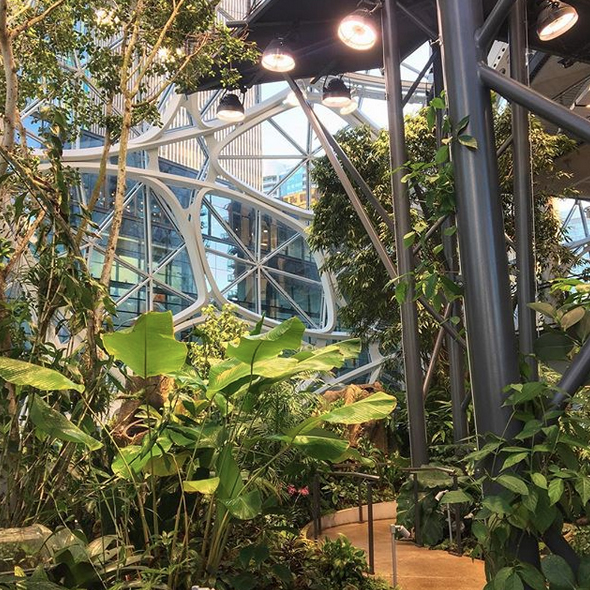
Amazon has created a nature-filled space to promote our connection with nature, improving health & well being. Photo: Courtesy Amazon via Instagram
We’re more than a little biased, but plants can solve a lot of problems. Green roofs, for example, can absorb excess rainwater and help mitigate flooding. Plants provide our oxygen, our food, our fuel, and the materials we rely on. Plants even help solar panels create more energy. We know: plants are amazing. We cannot survive without them.
Increasingly, research is showing that our leafy friends are helpful not only for our environment, but for our minds, as well. As rates of depression reach new heights worldwide, it turns out that plants can help with that, too. In a growing number of studies, spending time around and among plants and trees—even seeing photos of plants—has helped with everything from mental health to concentration, duration of illness to sense of purpose.
Note: by no means are we suggesting that our dirt-bound companions are replacements for therapy, medication or any other treatment protocols determined by your health professional. Always consult with your doctor first. What we are saying (because a lot of scientists said it before us) is that plants can soothe the soul, improve mood and even boost employee productivity.
What the science says
Are you ready for the fire hose of information we’re about to unleash? First up: A 2013 study that measured subjects’ physical reactions in the presence of office plants, and without the presence of office plants.
Researchers measured heart rate, level of blood oxygen and electrical activity in the brain in the presence of a range of plant colors, sizes and smells. You know what happened next: subjects’ physiologies were the healthiest in the presence of plants—and at the peak in the presence of green plants with a mix of sizes and lightly scented. Yeah, we love science too.
Next up? An in-depth article from Time magazine in which experts said that plants may reduce anxiety and stress, sharpen attention, increase happiness and life satisfaction, and might even make us more productive. Among students, having plants around correlates with better test scores (According to this 1996 study, when plants were added to a windowless computer lab, student reaction time jumped by 12%).
And in hospitals, patients get better faster when they have views of landscapes or lots of plants. They tend to use less pain medication and grumble less. Best of all? Plants don’t need anything in return—just water, sunlight, and the occasional serenade.
What our experience says
As a part time art student who got into the plant business while I was still in school, plants, to me, have always been like living art. And art, to me, is joyful. And joy? That’s the best version of mental health.
Science and pure observation underscore how plants are essential to human life. But in practice, I get to see how things like plantscaping, living green walls and even edible walls improve people’s lives on an emotional level. Beauty, growth and nature are not only life-supporting, but life-affirming.
In other words? When it comes to surrounding ourselves with more plants, spending more time among them and finding new and innovative ways to incorporate them into our urban lives, there is literally only upside. Not too shabby for green, photosynthesizing friends.
This is part 1 of a 3 part series. Click here to sign up to have our blog delivered to your email.
